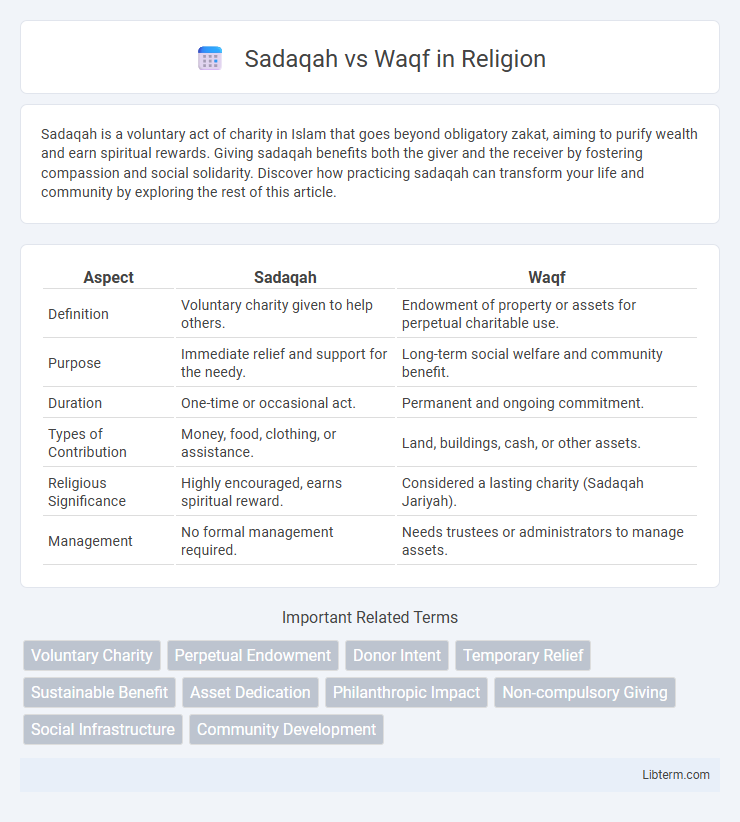Sadaqah is a voluntary act of charity in Islam that goes beyond obligatory zakat, aiming to purify wealth and earn spiritual rewards. Giving sadaqah benefits both the giver and the receiver by fostering compassion and social solidarity. Discover how practicing sadaqah can transform your life and community by exploring the rest of this article.
Table of Comparison
| Aspect | Sadaqah | Waqf |
|---|---|---|
| Definition | Voluntary charity given to help others. | Endowment of property or assets for perpetual charitable use. |
| Purpose | Immediate relief and support for the needy. | Long-term social welfare and community benefit. |
| Duration | One-time or occasional act. | Permanent and ongoing commitment. |
| Types of Contribution | Money, food, clothing, or assistance. | Land, buildings, cash, or other assets. |
| Religious Significance | Highly encouraged, earns spiritual reward. | Considered a lasting charity (Sadaqah Jariyah). |
| Management | No formal management required. | Needs trustees or administrators to manage assets. |
Understanding Sadaqah: Definition and Significance
Sadaqah refers to voluntary charity given out of compassion, love, friendship, religious duty, or generosity without expecting anything in return, making it a vital act in Islam for fostering social welfare and individual spiritual growth. Unlike obligatory Zakat, Sadaqah can be given at any time and in any amount, emphasizing kindness and immediate relief to those in need. Its significance lies in promoting empathy, reducing poverty, and strengthening community bonds through continuous acts of giving.
What is Waqf? Concept and Historical Background
Waqf is an Islamic endowment of property or assets dedicated permanently for charitable or religious purposes, generating ongoing benefits for the community. The concept dates back to the 7th century during the time of Prophet Muhammad and was institutionalized in various Islamic empires to fund mosques, schools, hospitals, and other public welfare projects. Historically, Waqf has played a crucial role in sustaining socio-economic development and supporting religious and educational institutions across the Muslim world.
Core Differences Between Sadaqah and Waqf
Sadaqah is voluntary charity given by individuals to support immediate needs or causes without expectation of return, while Waqf is a permanent endowment of assets dedicated to ongoing charitable purposes. Sadaqah involves one-time or recurrent donations that can be monetary or in-kind, whereas Waqf creates long-term, sustainable benefits through the preservation and management of property or funds. The core difference lies in Sadaqah's temporary nature versus Waqf's enduring commitment to public welfare and community development.
Types of Sadaqah: Voluntary and Ongoing
Sadaqah includes voluntary acts of charity performed out of compassion, generosity, or religious duty, often given as one-time donations to support individuals or causes. In contrast, ongoing Sadaqah, also known as Sadaqah Jariyah, involves continuous charitable acts such as building wells, funding education, or establishing healthcare facilities, providing sustained benefits over time. Waqf specifically refers to an endowment where assets or properties are donated permanently for religious or philanthropic purposes, ensuring long-term community welfare beyond one-time contributions.
Forms of Waqf: Property, Cash, and Institutional
Waqf represents a long-term endowed charity in Islam, encompassing forms such as property, cash, and institutional assets, which generate continuous benefits for the community. Unlike Sadaqah, which is a voluntary and often one-time act of giving, Waqf involves dedicating assets like land, buildings, funds, or organizations to serve public welfare indefinitely. Institutional Waqf includes establishments like schools and hospitals that operate sustainably through endowed funds, ensuring ongoing social impact and economic development.
Religious and Social Benefits of Sadaqah
Sadaqah, as voluntary charity in Islam, provides immediate spiritual rewards and social relief by addressing urgent needs such as food, shelter, and healthcare, fostering compassion and community solidarity. Unlike Waqf, which involves long-term endowments for sustainable projects, Sadaqah emphasizes personal generosity that purifies wealth and strengthens social bonds through continuous acts of kindness. The religious benefits include forgiveness of sins and increased blessings, while socially, Sadaqah reduces poverty and enhances collective well-being.
Long-Term Impact of Waqf on Communities
Waqf provides a sustainable source of funding by creating endowments that generate continuous benefits for communities, such as schools, hospitals, and infrastructure projects. Unlike Sadaqah, which is a one-time charitable donation, Waqf assets remain preserved and managed to produce ongoing social and economic development. This long-term impact supports poverty alleviation, education access, and healthcare improvement, fostering resilient and self-reliant communities over generations.
Administration and Governance: Sadaqah vs Waqf
Sadaqah is voluntary charity given without any formal administrative structure, relying primarily on the donor's intention and immediate distribution to beneficiaries. Waqf involves a legally established endowment managed by trustees or appointed administrators to ensure the long-term preservation and use of the endowed assets. Governance of Waqf typically includes formal oversight mechanisms, adherence to Islamic legal frameworks, and continual management to sustain community benefits over time.
Modern Applications: Sadaqah and Waqf Today
Sadaqah and Waqf play vital roles in contemporary Islamic philanthropy, with Sadaqah often directed towards immediate relief such as food, healthcare, and education for underprivileged communities. Waqf, traditionally involving endowment of property or assets, has evolved into modern applications including funding for schools, hospitals, and infrastructure projects that sustain long-term social welfare. Digital platforms and crowdfunding have further expanded the reach and impact of both Sadaqah and Waqf, enabling global participation and efficient management of charitable resources.
Choosing Between Sadaqah and Waqf: Factors to Consider
Choosing between Sadaqah and Waqf depends on the intended impact duration and purpose of the charitable act. Sadaqah provides immediate, flexible relief to individuals or communities, ideal for urgent or short-term needs, while Waqf establishes a long-term endowment, sustaining ongoing projects like schools, hospitals, or mosques. Analyzing factors such as whether the goal is temporary assistance or continuous benefit, asset type, and one's capacity for administration helps determine the most effective choice.
Sadaqah Infographic

 libterm.com
libterm.com